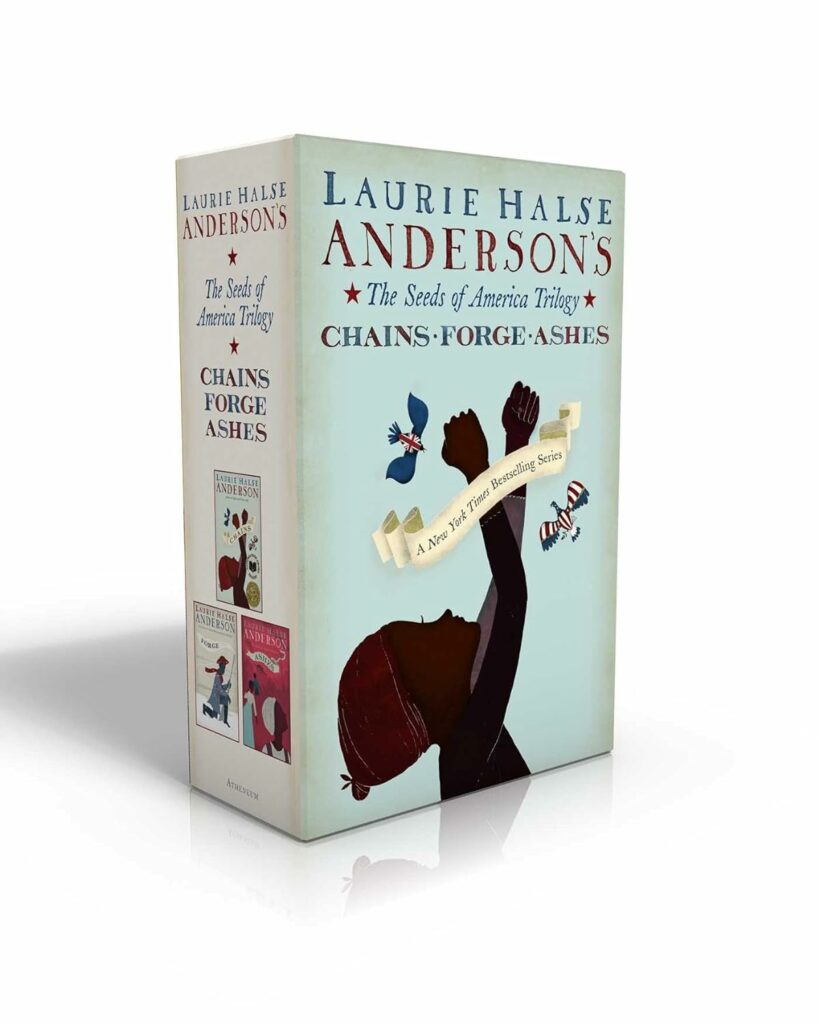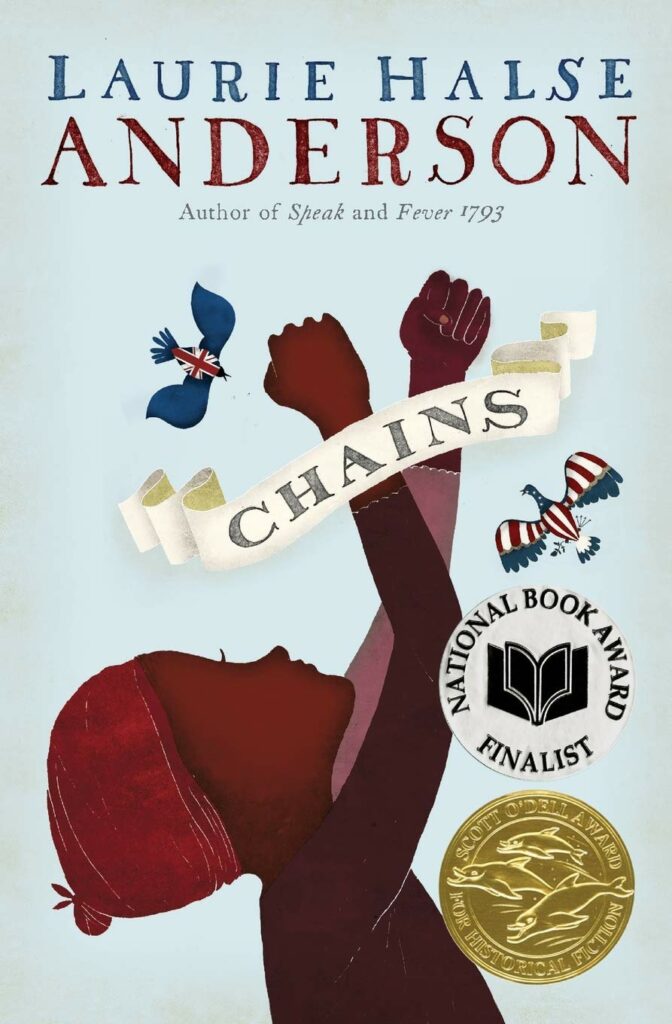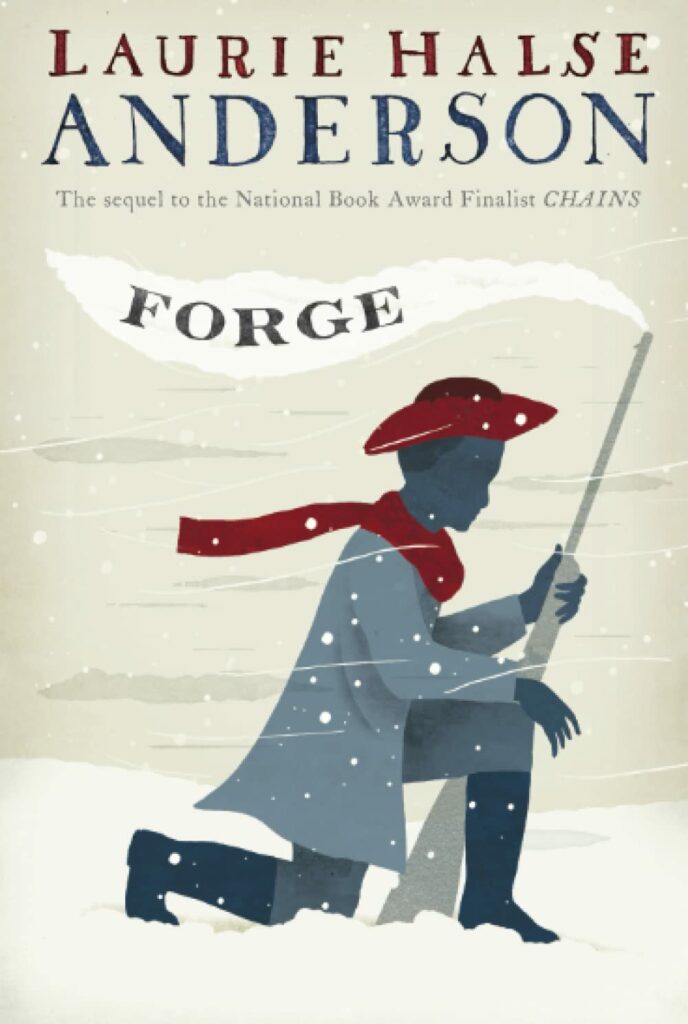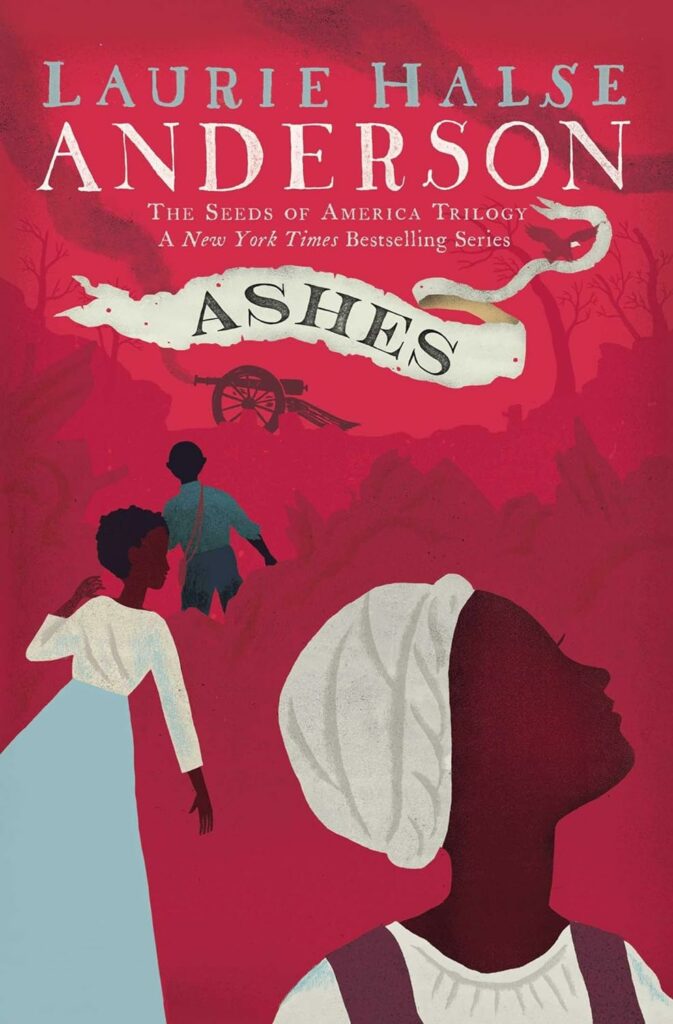The Seeds of America Trilogy powerfully examines some of the complex ideas of the American Revolution: freedom, justice, and equality for all.
Seeds of America Trilogy by Laurie Halse Anderson. Atheneum.

- Chains, 2008. 316 pages.
- Forge, 2010. 320 pages.
- Ashes, 2016. 320 pages.
Reading Level: Middle grades, ages 10-12.
Recommended For: Teens, ages 12 and up. (See below)
The Seeds of America Trilogy is popular with good reason: read in order, as a series, the sum is greater than its parts. Each volume adds to the overall storyline in unique ways, and, while the first volume (Chains) can stand alone, the series is better as a whole than any of the individual volumes. From its beginnings, we see Isabel, Curzon, and Isabel’s sister Ruth grapple with their slavery and attempted emancipation against the backdrop of the American Revolution. Which side, the British or the Americans, deserves their allegiance? Which side will give these young Black teens true freedom and respect? Will either?
Seeds of America #1: Chains

Isabel and her sister Ruth are expecting their freedom since their newly deceased owner had promised it upon her death. The woman’s relatives and connections have other plans, and suddenly Isabel and Ruth find themselves re-enslaved by the Locktons in New York City. In May of 1776, tensions are high everywhere, and New York City is no exception. Madame Lockton has zero sympathy for the American cause, urging her husband to keep up his support for the King. They must do so surreptitiously, though, since they are on American soil and surrounded by Patriots. The Locktons are cruel to both Isabel and Ruth, viewing them as distinctly less than human. To make matters worse, Isabel wakes up one morning to find her precious little sister sold down South. Ruth has been susceptible to mysterious fits ever since birth, and she is presented as somewhat simple-minded. Isabel thus feels even more keenly that she has somehow let this fragile soul down. Determined to find a way to escape the Locktons and rescue Ruth, she locks her own soul up tight while she watches for her opportunity. To add to the complexity, she is approached with a dangerous proposition: spy on the Locktons for the Patriots.
Are the Patriots any better than the Loyalists, though? Will the Patriots treat her any better? Who can she trust? The Americans are spouting off fine-sounding phrases about freedom and equality. Does that extend to her? An old man she befriends coaches her, “This not our fight…. British or American, that is not the choice. You must choose your own side, find your road through the valley of darkness that will lead you to the river Jordan…. Everything that stands between you and freedom is the river Jordan.”
Hovering in the background is a young enslaved man named Curzon. He’s enlisted with the Patriots because his master promised him freedom at war’s end for fighting in his place. When he’s captured with the rest of the Patriot army, Isabel becomes his one link to the world outside, at great risk to herself. Their fragile friendship takes root during the storms that swirl around them, and the book ends with the two of them standing together against the world.
Note: it’s possible to read this first as a stand alone, and, indeed, it’s a fine read on its own. But it lacks the overall “punch” of the Trilogy as a whole on its own.
Seeds of America Trilogy #2: Forge

Forge is written from Curzon’s perspective, and the book has an utterly different feel than Chains. Curzon begins by reflecting on the tenuous existence he and Isabel had eked out before she seemingly ran off and left him. He assumes she continued south, hunting Ruth, but he’s unable to track her down. Without her, Curzon is bereft and directionless until he ends up with a Patriot regiment. He’s had experience in the army, and he’s welcomed as a new recruit. Little does he know that he’s headed towards the infamous winter in Valley Forge, with cold, lack of food and medical care, and more awaiting him. To make matters worse, he’s sick with worry over Isabel.
Eventually, in the course of this novel, Curzon runs into Isabel; she’s been re-enslaved despite her emancipation “papers” (that she’d forged). To top it off, she’s now wearing an actual chain around her neck to prevent her escaping once more. Curzon himself is betrayed by his own former owner, and the two teens must again forge a path forward despite all odds.
Who can they trust? Anyone? Are the Patriots, with all their talk of freedom and justice, no better than the Brits? Curzon’s loyalties lie still with the Patriots; Isabel is her own woman, refusing to trust anyone unless they can guarantee her safe passage to her sister.
Considerations:
- Sexuality: this book contains some disturbing images and insinuations, particularly in reference to Isabel. Curzon is quite protective over her and imagines that she is unsafe if alone in the presence of their hated master. Little to no detail is provided, so this will go over the heads of those young enough to be oblivious.
- Violence: Additionally, the book opens with a violent image of a soldier getting shot; more images of war follow.
- Coarse Language: Soldiers aren’t known for being polite in their own company; plenty of comments about farting and other comments about bodily functions abound in Curzon’s little group (to much laughter). Additionally, there are some derogative racial terms occasionally, as is expected given the time and circumstances.
- Profanity: Or is it? Some instances that could be construed as prayers in dire circumstances.
Seeds of America Trilogy #3: Ashes

The final book in this trilogy shifts back to Isabel’s perspective as she and Curzon continue to make their way south, seeking Isabel’s sister Ruth. Ruth is now 12, similar to Isabel’s age when the series began. Isabel is in her late teens, a young woman. Curzon and Isabel find Ruth early on in the story, and Isabel learns the truth: the Locktons (from book 1), hadn’t sold Ruth. They’d merely sent her to one of their other holdings further south. Ruth was young enough when she was sent away, and was lied to by the Locktons, that she doesn’t trust Isabel. She was told Isabel had abandoned her. Isabel’s own heart has been hardened over the years, too, as she’s struggled to survive against all odds. Can the two sisters rebuild their relationship?
The bulk of the story in this final volume centers around Curzon, Isabel, and Ruth’s flight from the Locktons’ plantation, back North. They are accompanied by Aberdeen, another young runaway who clearly cares for Ruth. Equipped with emancipation papers (forged), they head to Williamsburg where the Patriot army is gearing up for another battle. Once in Williamsburg, events abruptly shift, and suddenly Isabel finds herself alone with Ruth, washing clothes and linens for room and board. Curzon and Aberdeen appear to have their own plans and connections, and the girls hardly see them. When Isabel next runs into Curzon, she finds him with the army again, proudly supporting the Patriots. (Incidentally, she is allied with Curzon in a surprising new way, but I won’t spoil it for you!) Isabel is still refusing to support either side, convinced that no White army will give her the freedom she so desperately craves.
Considerations:
- Same song, third verse: All of the above considerations are present in this final book with perhaps a bit more intensity. These are older teens fighting to survive during a desperate war. Violence, injuries, crude language, and the rest all make an appearance, although none of these detract from the story. All feel in keeping with the historical time period.
- Romance: This one ends with a wedding! (A great ending to this trilogy.)
*Seeds of America Trilogy as a Whole
Taken as a whole, this trilogy is a masterpiece. Anderson is not only a gifted writer but an outstanding historian. Readers will come away with a new understanding of, and appreciation for, the complexities of this time period. Each chapter begins with a quotation from a historical source connected with the American Revolution/its times; these quotations are sometimes ironic, offering insight into the turmoil Isabel experiences as she tries to weigh the lofty-sounding ideals of freedom with her own personal experience. Each volume includes significant back matter explaining which characters are historical, what actually happened, and other bits of historical context. Writers of historical fiction must balance sounding like the time period of their characters with helping contemporary readers understand what’s going on. Anderson does this effortlessly, using phrasings that are typical of the day (“conversating” instead of “talking”). The reader is immersed in the setting without being confused.
Isabel has a fledgling, confused Christian faith. She references her mother’s habit of churchgoing, trying to honor it. At the same time, she is convinced she sees ghosts. Her faith, small as it is, adds an interesting dimension to her experiences. She matures mightily over the course of the trilogy, from a stubborn fixation on her own goals in the beginning to a growing humility and willingness to learn from and lean on those around her. Her relationship with Curzon is a delight to watch as it develops from seeming coincidence into a rich tapestry, woven from many hard experiences and mutual respect. A wedding as the ending to this series signifies a new beginning, a new life that will still face hardship, but one in which the main characters have grown from children into adults.
For years I’d dreamt of the time when our lives would not be in constant peril, when I’d have the luxury of choosing the course to take. Turned out that having choices could be nearly a prickly and upsetting as having none.
~p. 264
Things to Discuss in The Seeds of America Trilogy
- Freedom: What does freedom mean? Who “deserves” freedom? What does biblical freedom look like? Can a soul be enslaved when a person is technically “free”? How did the Founding Fathers’ rhetoric play out when slavery was concerned? (These are big questions that don’t necessarily have right answers. We don’t need to be afraid to grapple with them. Just because a “hero” had flaws or worked out a new philosophical ideal imperfectly doesn’t mean the idea was a bad one in the first place or that the flawed hero isn’t still worth celebrating. It’s a good reminder to thank the Lord for the good He has done through imperfect servants through history. And it should cause us to humble ourselves because we all have blind spots.)
- Justice and Equality: similar/related to the idea of freedom, but with more nuance. Discuss what true justice and equality mean. Discuss the difference between equality of opportunity and equality of outcome (there’s a BIG difference!). How can we pursue biblical practices in these areas? What does the Bible have to say about them?
Overall Rating: 4.75/5
- Literary/Artistic Rating: 5
- Worldview Rating: 4.5
Read more about our ratings here.
Related Reading from Redeemed Reader
- A Book Review: Fever 1793 by Laurie Halse Anderson: a stand alone set during the yellow fever epidemic in Philadelphia
- A Book Review: Abigail Adams: Witness to a Revolution by Natalie S. Bober. An outstanding biography that would make a great companion read to the Seeds of America. Anderson quotes Abigail several times!
- A Book Review: Land of Hope by Wilfred McClay. We starred this textbook for its terrific approach to American history. Highly recommended.
We are participants in the Amazon LLC affiliate program; purchases you make through affiliate links like the one below may earn us a commission. Read more here.
Support our writers and help keep Redeemed Reader ad-free by joining the Redeemed Reader Fellowship.
Stay Up to Date!
Get the information you need to make wise choices about books for your children and teens.
Our weekly newsletter includes our latest reviews, related links from around the web, a featured book list, book trivia, and more. We never sell your information. You may unsubscribe at any time.
We'd love to hear from you!
Our comments are now limited to our members (both Silver and Golden Key). Members, you just need to log in with your normal log-in credentials!
Not a member yet? You can join the Silver Key ($2.99/month) for a free 2-week trial. Cancel at any time. Find out more about membership here.

